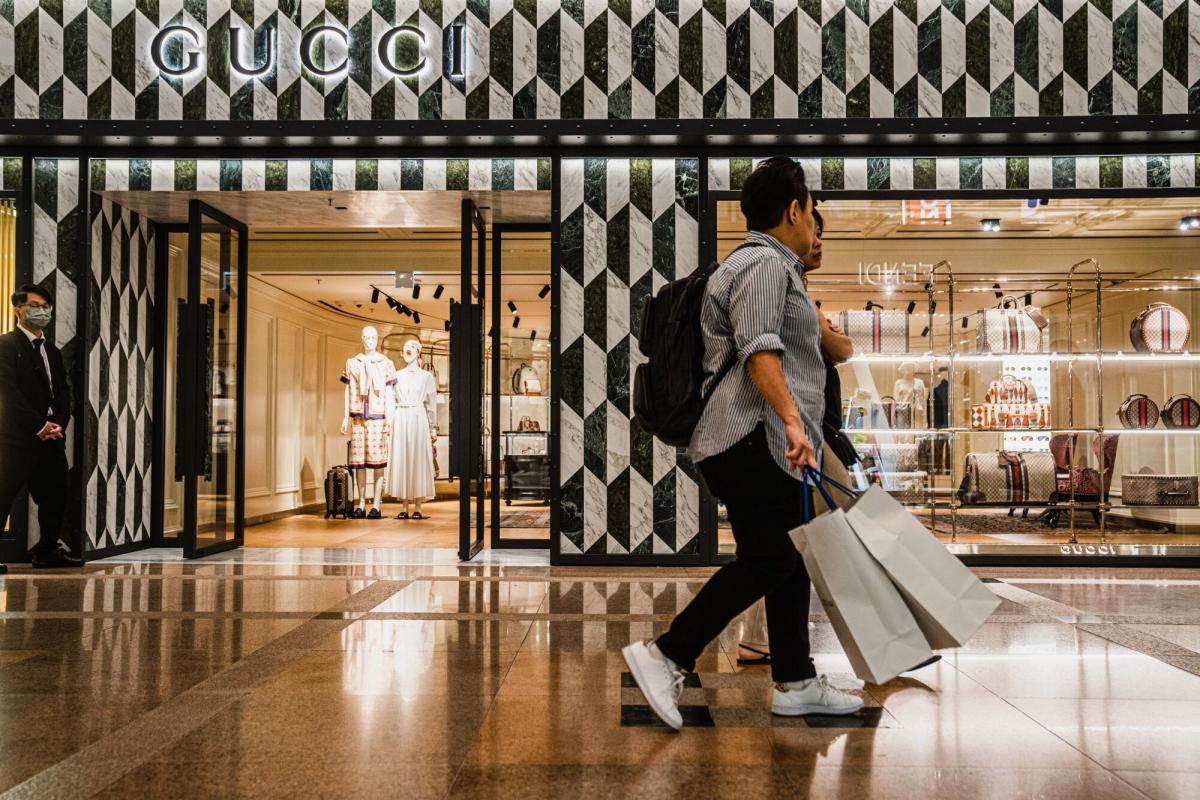(Bloomberg) — Shares of Kering SA fell after the French luxury group warned that sales at Gucci, its largest brand, fell about 20% in the first quarter.
Most read from Bloomberg
The stock fell as much as 15% in Paris trading, the biggest intraday decline since 1992, wiping more than 7 billion euros ($7.6 billion) off Kering's market value.
The sales decline at Gucci – more dependent on China than some of its luxury peers – was due to a sharper-than-expected decline in the Asia-Pacific region. The fashion group is trying to revive Gucci, the Italian brand that generates about two-thirds of profits, to no avail. The warning is likely to spark renewed speculation about how Kering might reduce its reliance on the brand, whose fortunes have swung sharply over the years in response to changing tastes.
Kering, controlled by the billionaire Pinault family, has struggled to keep up with rivals such as LVMH Moet Hennessy Louis Vuitton SE and Hermes International SCA, as sales of luxury products have slowed over the past year, especially in China. LVMH's broader brand portfolio and longer waiting lists for Hermès handbags have made those companies more resilient.
“Gucci has faced some company-specific issues for several quarters, but this update will raise further concerns about the state of consumer spending and the Chinese economy,” analysts at Vital Knowledge wrote in a note to clients.
Read more: China's tepid recovery has left luxury stores dependent on US demand
Overall, comparable sales at Kering, which also owns brands such as Yves Saint Laurent and Balenciaga, will decline about 10% during the period, the company said.
New designer
Gucci's sales declined in the final months of last year, as the brand struggled to attract more affluent shoppers to its pricey Double G belts and Princetown slippers. Francois-Henri Pinault, Kering's chief executive, warned last month that huge investments in its brands would pressure the group's results this year.
Sabato Di Sarno was appointed as the brand's new designer last year and unveiled his first collection in September in Milan, which showed a sleeker, more minimalist aesthetic compared to the polished look of his predecessor Alessandro Michele.
Read more: Sabato Di Sarno's Gucci debut showcases mini skirts and loafers
Gucci has long been one of the most volatile luxury brands, its fortunes rising and falling based on the hype surrounding designers like Michele and his predecessor, Tom Ford.
The problems facing Kering coincide with a decline in the luxury goods market and, in particular, weak demand in China. The Asia-Pacific region excluding Japan accounted for 35% of the group's revenue last year, more than Western Europe and North America.
“The jury is still out on whether the Chinese will like the quiet luxury of Sabato di Sarno,” said analyst Luca Solca and his colleagues at Bernstein, referring to the current trend for more minimalist looks.
Early ready-to-wear products from Ancora's latest collection are receiving a “very positive reception,” according to Kering. The company said its availability will increase in the coming months.
Kering's unexpected announcement is “a somewhat worrying sign for the luxury goods sector,” wrote Thomas Schuvit, an analyst at Citigroup. Its largest brands suffer from “being in the midst of a major design and management transition, with poor performance from carryovers and limited penetration of early products” for the new range, which was delivered to only a third of the store network in mid-February.
Meanwhile, Kering has been active in the acquisition business, buying perfume maker Creed as well as a 30% stake in Valentino. Earlier this year, it announced the purchase of a building on Fifth Avenue in Manhattan for $963 million, as the search for luxury retail assets heats up among luxury players. However, none of these deals were transformative, leaving the company heavily reliant on Gucci for the time being.
Although Kering had its own problems with Gucci, investors in some other fashion companies were dismayed by its warning. Burberry Group Plc, another company in transition, fell as much as 6%, while Cartier owner Richemont fell as much as 4.7%.
Kering said in February that recurring operating income this year would decline from 2023, especially in the first half, and said it would remain “vigilant and disciplined regarding its cost structure.”
(Updates include details on China exposure, earnings forecasts, and competitor stocks)
Most read from Bloomberg Businessweek
©2024 Bloomberg L.P

“Typical beer advocate. Future teen idol. Unapologetic tv practitioner. Music trailblazer.”







More Stories
JPMorgan expects the Fed to cut its benchmark interest rate by 100 basis points this year
NVDA Shares Drop After Earnings Beat Estimates
Shares of AI chip giant Nvidia fall despite record $30 billion in sales